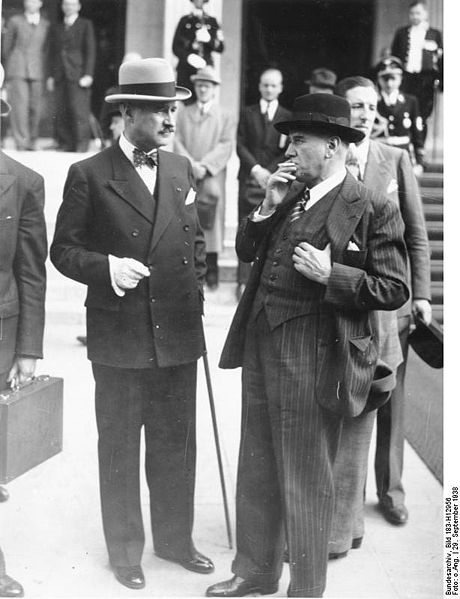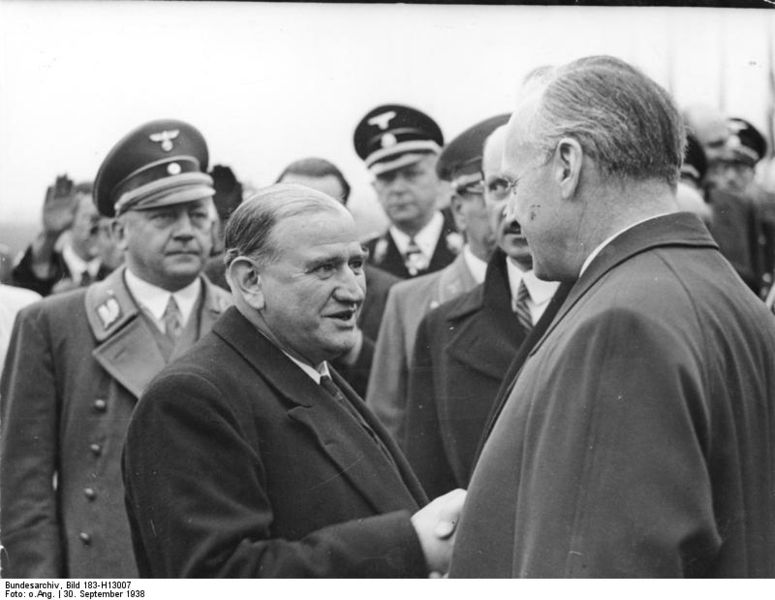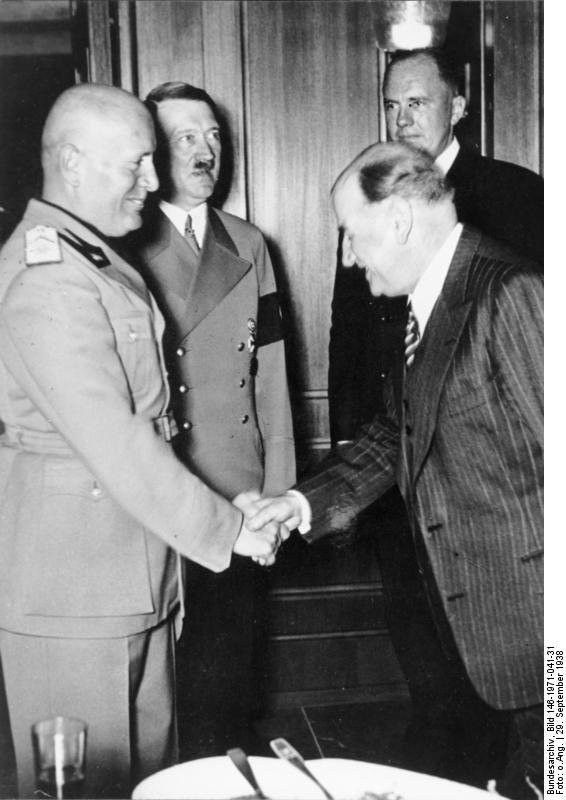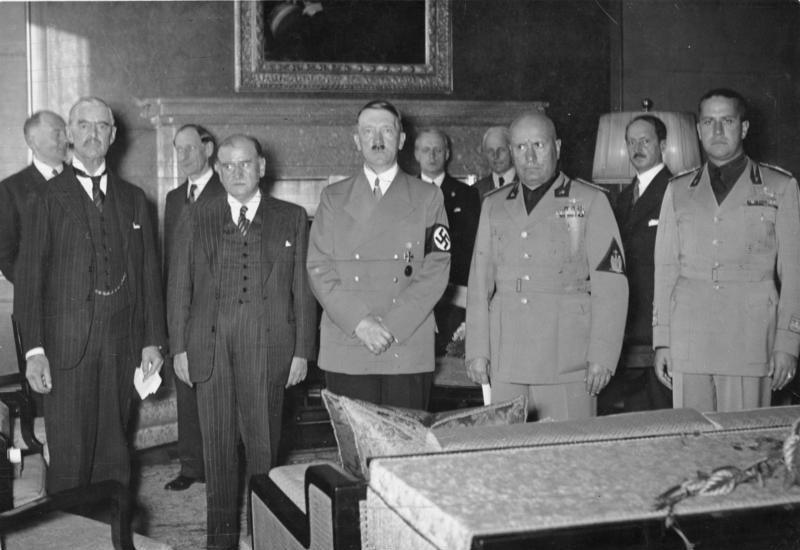<Back to Index>
- Sociologist and Philosopher Jürgen Habermas, 1929
- Architect Bartolomeo Ammanati, 1511
- Prime Minister of France Édouard Daladier, 1884

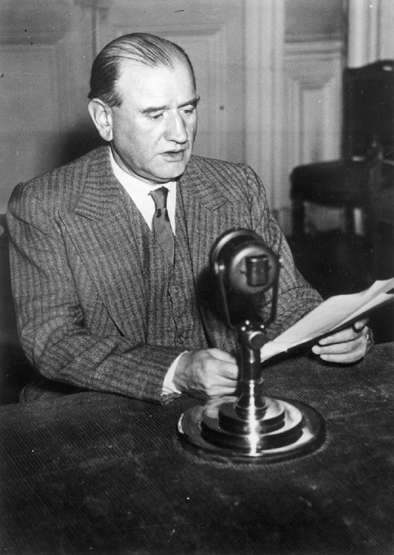

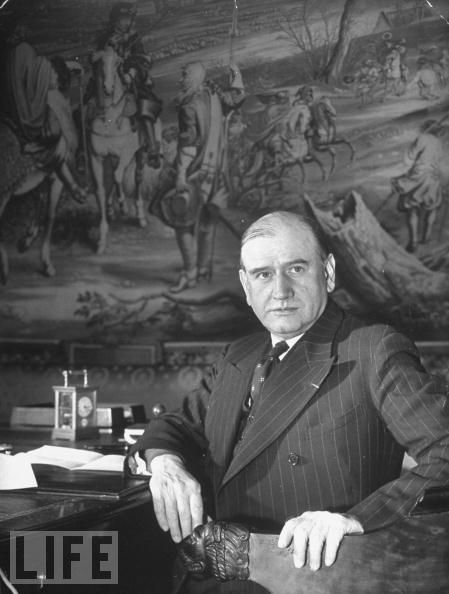
Édouard Daladier (18 June 1884 – 10 October 1970) was a French Radical politician, and Prime Minister of France at the start of the Second World War.
Daladier was born in Carpentras, Vaucluse (later, he would become known to many as "the bull of Vaucluse" because of his thick neck and large shoulders and determined look, although cynics also quipped that his horns were like those of a snail). During the First World War he rose from private to captain and company commander.
A government minister in various posts during the coalition governments between 1924 and 1928, he was instrumental in the Radical Party's break with the socialist SFIO in 1926 (the first Cartel des gauches – "Left-wing Coalition"), and with the conservative Raymond Poincaré in November 1928. Daladier
became a leading member of the Radicals. He first became Prime Minister
during 1933, and then again in 1934 for a few weeks when the Stavisky Affair led to far right 6 February 1934 riots and the second Cartel des gauches fall from power. Daladier became Minister of War for the Popular Front coalition in 1936, and became Prime Minister again on 10 April 1938 after the fall of the Popular Front. His term in power saw the Munich Agreement, when France backed out of its obligations to defend Czechoslovakia against Nazi Germany. He was pushed into negotiating by Britain's Neville Chamberlain,
without which war would have been inevitable at that time. Unlike
Chamberlain, Daladier was under no illusions about Hitler's ultimate
goals. In fact, he told the British in a late April 1938 meeting that
Hitler's real aim was to eventually secure "a domination of the
Continent in comparison with which the ambitions of Napoleon were
feeble." He went on to say "Today it is the turn of Czechoslovakia.
Tomorrow it will be the turn of Poland and Romania. When Germany has
obtained the oil and wheat it needs, she will turn on the West.
Certainly we must multiply our efforts to avoid war. But that will not
be obtained unless Great Britain and France stick together, intervening
in Prague for new concessions but declaring at the same time that they
will safeguard the independence of Czechoslovakia. If, on the contrary,
the Western Powers capitulate again they will only precipitate the war
they wish to avoid." Nevertheless,
perhaps discouraged by the pessimistic and defeatist attitudes of both
military and civilian members of the French government as well as
traumatized by France's blood bath in the first World War that he was
personally a witness to, Daladier ultimately let Chamberlain have his
way. On his return to Paris, Daladier, who was expecting a hostile
crowd, was acclaimed. He then told his aide, Alexis Léger: "Ah, les cons (the fools)!".
In
October 1938, Daladier opened secret talks with the Americans on how to
bypass American neutrality laws and allowed the French to buy American
aircraft to make up for productivity deficiencies in the French
aircraft industry. Daladier
commented in October 1938 that "If I had three or four thousand
aircraft Munich would never have happened", and was most anxious to buy
American war planes as the only way of strengthening the French Air
Force. A
major problem in the Franco-American talks was how the French were to
pay for the American planes, and how to bypass the American neutrality
acts. In addition, the American Johnson Act of 1934 which
forbade loans to the nations that had defaulted on their World War I
debts was a further complicating factor (France had defaulted on its
World War I debts in 1932). In
February 1939, the French offered to cede their possessions in the
Caribbean and the Pacific together with a lump sum payment of ten
billion francs, in exchange for the unlimited right to buy on credit
American aircraft. After
torturous negotiations, an arrangement was worked out in the spring of
1939 allowing the French to place huge orders with the American
aircraft industry; though most of the aircraft ordered had not arrived
in France by 1940, the Americans arranged for French orders to be
diverted to the British. When the Molotov-Ribbentrop Pact was signed, Daladier responded to the public outcry by outlawing the French Communist Party, which had refused to condemn Joseph Stalin's actions. In 1939, after the German invasion of Poland he was reluctant to go to war, but did so on 4 September 1939 – inaugurating the Phony War.
On 6 October of that year, Hitler offered France as well as Great
Britain a peace proposal. There were more than a few in the French
government prepared to take Hitler up on his offer, but Daladier
declared in a nationwide broadcast the next day "We took up arms
against aggression. We shall not put them down until we have guarantees
for a real peace and security, a security which is not threatened every
six months.". On 29 January 1940, in a radio address delivered to the people of France entitled The Nazi's Aim is Slavery,
Daladier left little doubt about his opinion of the Germans. In his
radio address he said: "For us there is more to do than merely win the
war. We shall win it, but we must also win a victory far greater than
that of arms. In this world of masters and slaves, which those madmen
who rule at Berlin are seeking to forge, we must also save liberty and
human dignity." In March 1940, Daladier resigned as Prime Minister in France, due to his failure to aid Finland's defence during the Winter War, and was replaced with Paul Reynaud. Daladier remained, however, Minister of Defence, and his antipathy to Paul Reynaud prevented Reynaud from replacing Maurice Gamelin as Supreme Commander of all French armed forces.
As a result of the massive German breakthrough at Sedan, Daladier
swapped ministerial offices with Reynaud, taking over the foreign
ministry while Reynaud took over defence, and Gamelin was finally
replaced on 19 May 1940, 9 days after the Germans began their invasion campaign on 10 May, by Maxime Weygand. Daladier fled with other members of the government to Morocco, under the impression that the government would continue in North Africa, but was arrested and tried for treason by the Vichy government during the "Riom Trial". He was kept in prison from 1940 to 1943, after which he was handed out to the Germans and deported to Buchenwald concentration camp in November 1942 and in 1943 in the Itter Castle in North Tyrol with other French high personalities until the end of World War II. After the conflict ended, Daladier was a member of the Chamber of Deputies, and an opponent of Charles de Gaulle. He was also mayor of Avignon from 1953 until 1958. He died in Paris and is buried in the famous cemetery of Père-Lachaise.
